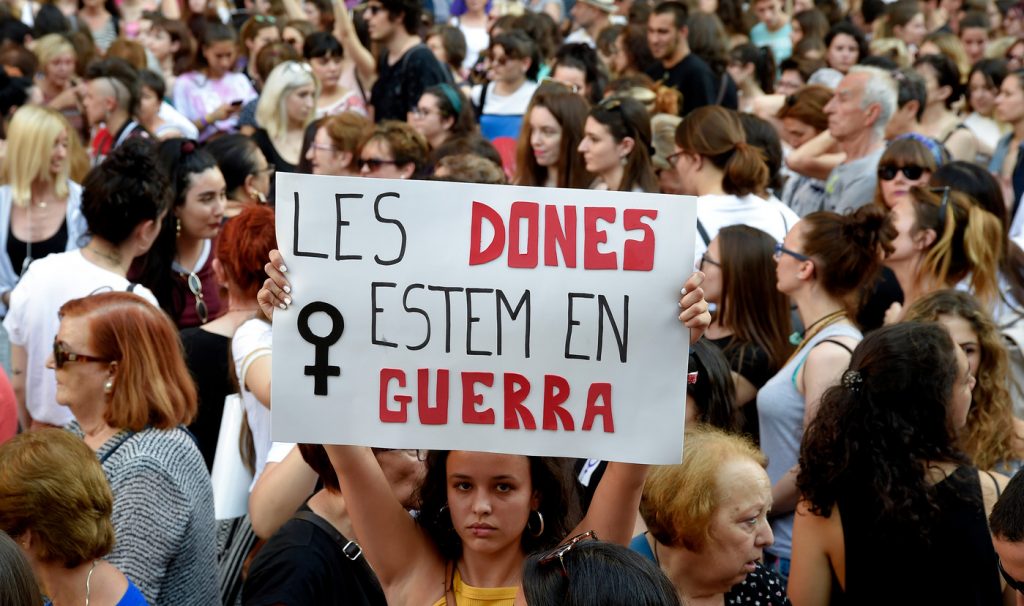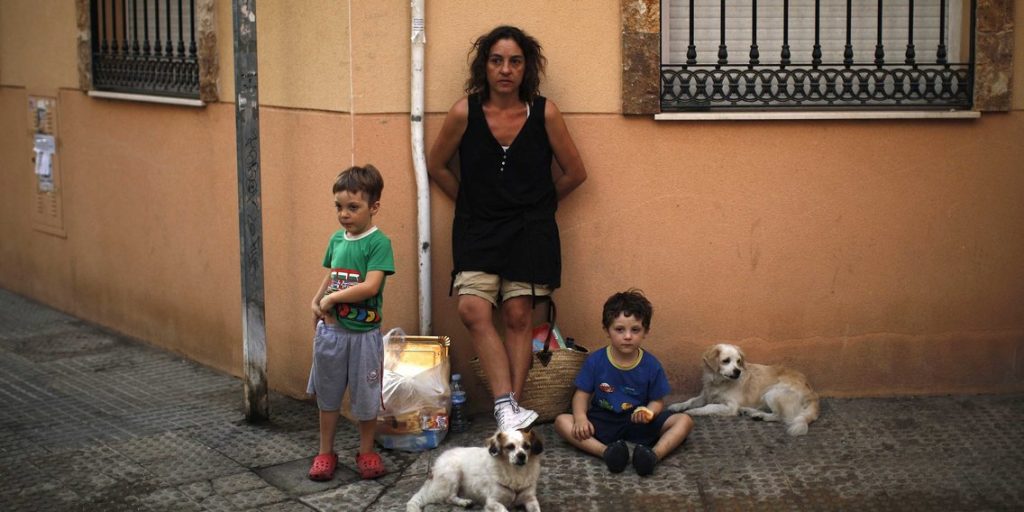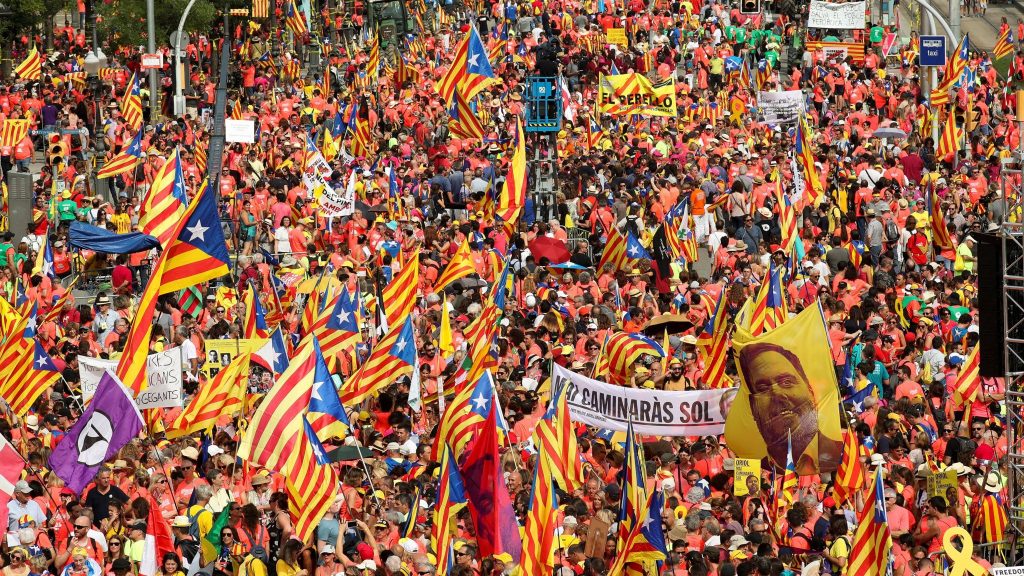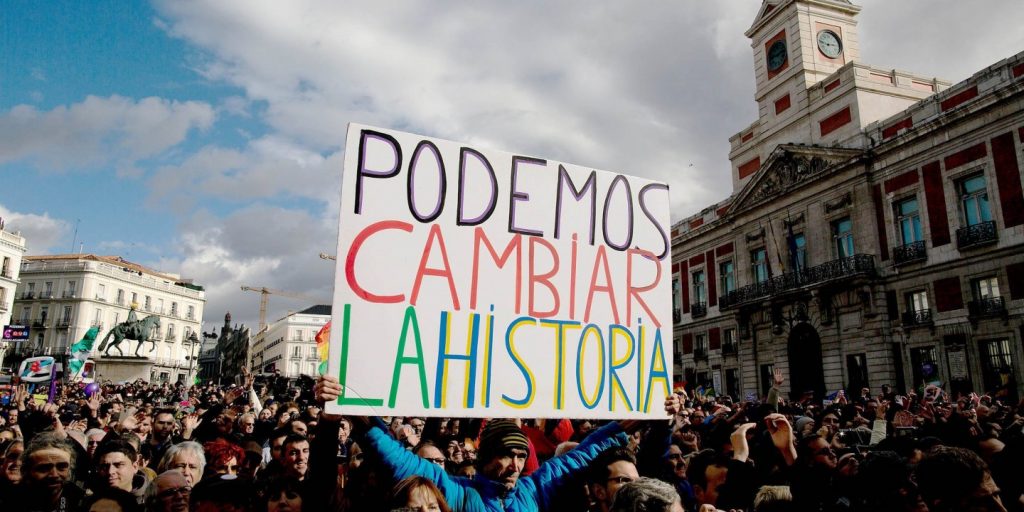RIO DE JANEIRO, BRAZIL – “Many people are still afraid of us. But one day we will become an integral part of the politics of this country,” predicted Pablo Iglesias when he founded his left-wing party Podemos (“We can”) in a Madrid theatre six years ago.
He was right; his movement has arrived at the forefront of Spanish politics. Iglesias, long dismissed as an ‘enfant-terrible’ by the old-established parties, was elected vice prime minister of Spain in early January.

1 The anger of youth
Iglesias began his political career with the Spanish communist youth movement, later ‘The man with the ponytail’ gave passionate speeches as a professor of politics and contemporary history at a Madrid university.
Even then, he showed solidarity with the young Spaniards who called themselves the ‘indignados’ and protested against abuses in their country in the 15-M movement, starting on 15 May 2011.
They camped in the central squares of the big cities to demonstrate against unemployment and the lack of prospects for their generation. At that time, Spain was in the grip of the financial and economic crisis that began in 2008 with the bursting of the property bubble.
It wasn’t only young people who felt abandoned by politicians. Many parents and grandparents also took to the streets to express their anger against the austerity policies of the socialist government of José Luis Rodríguez Zapatero.
Zapatero had taken former German Chancellor Gerhard Schröder, and his 2010 Agenda as a model, and introduced a labour market reform. The protest was inevitable. The traditional left, the demonstrators complained, had betrayed their principles. The trade unions also mobilized against Zapatero, who demanded more and more sacrifices from the Spanish people in order to comply with the austerity measures imposed by Brussels.
In the parliamentary elections at the end of 2011, the socialist paid the price. He was voted out of office and the right-wing conservative Partido Popular (PP) received an absolute majority.

2 The anger of the crisis sufferers
From this point on, however, things got even worse. The new head of government, Mariano Rajoy, has continued to tighten the thumbscrews because he needs additional funding to save the Spanish banking system from collapse. Savings have been made wherever possible: in schools, universities and health care, in civil servants’ salaries and pensions. Rajoy further tightened the labour market reform of his predecessor.
Whereas under Zapatero, layoffs had been made cheaper, it is now common to hire people at low cost. Temporary employment contracts, often lasting only a few days or weeks became the norm. As a result, almost 90 percent of newly concluded employment contracts are now on a limited basis.
The idea of the “lost generation” was born. Many young Spaniards emigrated to find better-paid jobs. Those left behind often did not even have enough money to move out of their homes or start families. Today, Spain has one of the lowest birth rates in the world.
In the 2015 elections, Rajoy was given a lesson and the PP lost its absolute majority. At the same time, the elections heralded the end of the two-party system in Spain, which had dominated political life since the beginning of democracy in 1978.
Previously, socialists and conservatives had alternated in power, but now voters were turning in droves to the new parties on the left and right of the spectrum. This made the formation of stable governments more difficult or even prevented them altogether.
The liberal Ciudadanos Civic Party won 40 seats in the 2015 elections, and Podemos won 69. What the new parliamentary groups had in common was the youth of their party leaders and their disrespect for the veteran politicians, whom they blamed for the economic crisis and rampant corruption.
Albert Rivera, then head of Ciudadanos, quickly rose to superstar status in the center, thanks to his uncompromising stance on corruption and the ‘amigo politics’ of traditional parties. His clients were traditional center-right voters who wanted to put an end to the swamp.
The PP faced even more competition, this time from the far right. For decades the party had faced no competition from them; since the end of the dictatorship the right had been the political home only of old Francoists and monarchists.

This changed with the emergence of the right-wing nationalist party Vox, which in 2018 for the first time made the leap into seats in a regional parliament. In the meantime, the party founded by Santiago Abascal, a former member of the PP, is represented throughout Spain. With his populist attacks on immigration and with “law and order” slogans on the Catalonia issue, Abascal scores points mainly in the countryside and in the working-class districts of cities, where the crisis has left deep scars.
Vox has now risen to become the third-strongest group in parliament and even overtook Podemos in the 2019 autumn elections. With the success of right-wing populists, the other two conservative forces have been forced into action. Since then they have been echoing the discourse of Vox.
3 The anger of the Catalans
“Spain’s political system is in an extremely weak state,” adjudged the now deceased and renowned historian Santos Juliá. The confrontation between the political parties, which was being fought out with ever harsher tactics, had buried the spirit of the “Transición”, the peaceful transition from dictatorship to democracy.
This is not only evident in the power struggle between the parties, but also in the territorial power structure, and explains the worsening of the situation in Catalonia.
In fact, many Catalans found it an unacceptable humiliation when the Madrid Constitutional Court, at the instigation of the 2010 PP, emasculated the Statute of Autonomy for the region, which had previously been approved by the parliaments in Madrid and Barcelona. The judges revoked autonomy in the fields of justice and tax sovereignty and declared null and void the definition of Catalonia as “a nation” in the preamble of the statute.
From that point on, supporters of independence became more and more popular. The government of Mariano Rajoy refused to enter into debate, and instructed the courts to find a legal solution to the political problem.

However, Rajoy had underestimated the determination of many Catalans to secede from Spain, especially since independence had previously been a project of the Catalan elites, and had not met with broad approval from the population.
The problem was also misjudged because the bourgeois nationalist parties formerly ruling in Catalonia, alongside the long-time regional president Jordi Pujol, had served for many years as majority representatives for the major popular parties in the Madrid parliament.
In return, they received funding for major projects in their region, but because of the financial crisis, Rajoy was left empty-handed. Worse still, during the recession, he demanded disproportionately large sacrifices from wealthy Catalonians.
This went so far that the Catalans could no longer be properly cared for in some of their hospitals. This meant that the austerity policy led to more and more Catalans seeing separation from Spain as a way out.
A first independence referendum was held in 2014, which was only symbolic in nature. The conflict escalated further with the holding of the second referendum on Independence Day in October 2017, which was banned by the Constitutional Court, as well as the flight to Belgium of Carles Puigdemont, the head of Catalan’s government deposed by Madrid, and the conviction of the organizers of the referendum who had stayed behind.

But at the same time the balance of power in the Madrid parliament has shifted in favor of the Catalans. The abstention of the thirteen deputies of the left-wing Republican party, ERC, was decisive for the election of socialist Pedro Sánchez as Spain’s prime minister in early January.
Sánchez’s left-wing coalition won the vote by a wafer-thin majority over the right-wing bloc. The losers seethed with anger and called Sánchez a traitor in parliament – referring to his willingness to engage in dialogue with the Catalans.
4 The political culture suffers from anger
From now on, Sánchez is likely to interpret even the smallest concession to the Catalans as weakness and criticize it harshly. Since the prime minister only has a tiny majority and will depend on Catalan votes for his political projects, he will also be a very vulnerable target.
The balance of power between left and right has not changed in parliament despite its fragmentation into 16 parties. What is new is that the heated climate is increasingly affecting the political culture and coexistence of Spaniards.
During the tumultuous debates in Parliament, in which insults, drumming and boos are commonplace, it is sometimes feared that the representatives of the people may come to blows. The polarisation among Members of Parliament, who perfectly represent the anger of Spanish society, is a bad omen for the new legislature – and for the country as a whole.

